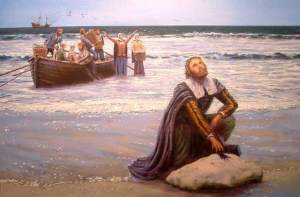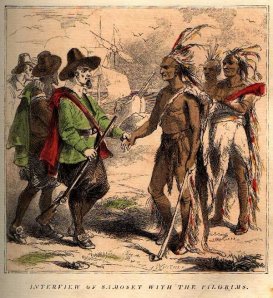Dear Journal, September 6, 1620
After many days of safe travel, we encountered crosswinds, and fierce storms. There was much rumor and fear that the ship will not be able to perform the voyage. We had to fix the boat with what tools we had and drift where the vast ocean was to take us, in God’s hands.
Dear Journal, September 9, 1620
Today, after much debate, we resolved to bear up and endure the wind. Tomorrow we will continue our travel and hopefully arrive at the Cape and go ashore.
Dear Journal, September 10, 1620
We have arrived today at the Cape! However, I am saddened to say that our arrival upon land has only brought more problems. We have no friends or relatives to warmly welcome us, no homes to sigh in relief in, no towns or shelters to seek for help, and no one to accommodate us to the new land. We know that there are people here that do not want us here; we know they’d rather place arrows in our sides than to help us. All we have to do is pray, survive to the best of our ability, and leave this is God’s hands.
Dear Journal, March 3, 1621
During the months of January and February we lost many to the scurvy, so many that nearly half were gone. About fifty remain, out of the fifty that remain only a scare number are able to fetch wood, make fires, make beds, wash clothes, and help those that are sick. It was by God’s Will that we survived and are still able. We’ve learned that there are some of us who are friends in time of joy, some who are friends in time of hardship and struggles, and some who are selfish and cling to their survival during times of hardship and struggles.
Dear Journal, March 16, 1621
After several Indians came skulking about us and stool our tools, today a certain Indian came and spoke to us in broken English. The Indian’s name is Samoset, his ability to speak English so well surprised many of us, we marveled at his pronunciation of each word. We learned he was from the eastern parts.
Dear Journal, April 1, 1621
Today Squanto, another Native of this area, who had been English and could speak English far better than Samoset, visited us. After we entertained and gifted Squanto he made peace with us. The terms of peace contained this exactly:
- That neither he nor any of his should injure or do hurt to any of the people.
- That if any of his did any hurt to any of theirs he should send the offender, that they might punish him.
- That if anything were taken away from any of theirs, he should cause it to be restored; and they should do the like to his.
- If any did unjustly war against him, they would aid him; if any did war against him, he should aid them.
- He should send to his neighbor’s confederates, to certify them of this, that they might not wrong them, but might be likewise comprised in the conditions of peace.
- That when their men came to them, they should leave their bows and arrows behind them.
Dear Journal, October 10, 1621
A reflection of the past, of our growth in this wonderful community…
Squanto continued to stay with us, whose help could never be fully thanked or repaid. Squanto directed us in how to set our corn, where to take fish, to procure other commodities, took us various places for our benefit, and never left us until his death.
Dear Journal, December 17, 1621
Winter is creeping closer, yet, this time our stomachs are full and our bodies are strong. We’ve been gathering the harvest; there has also been great store of turkeys, and a plentiful of Indian corn. Many write to their friends in England, of our well being and prosperity, these tales are indeed true.
*Source: Prentice Hall Literature: The American Experience. Upper Saddle River , NJ: Pearson Prentice Hall, 2007. Print.



Leave a comment